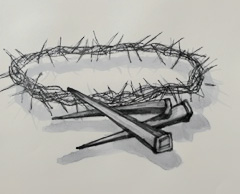“He said to him the third time, “Simon, son of John, do you love me?” Peter was distressed that he had said to him a third time, “Do you love me?” and he said to him, “Lord, you know everything; you know that I love you.” Jesus said to him, “Feed my sheep.”
John 21:17 (NAB)
Jesus asked Peter three times in a row if heloved Him. Since He already knew, why did He ask three times ? Maybe Peter needed to hear himself answer three times, while struggling with feelings of unworthiness, after he denied knowing Jesus.
Jesus never mentions Peter’s previous denial of Him, because Peter already repented, and God doesn’t dwell on our past mistakes. He is only interested in the present, asking us where we are now and today. Sometimes we obsess over our own history more than God does. Jesus was bringing Peter out of his past, and into the present because He knew Peter had the potential to be a great leader who would feed His sheep.
When the disciples were telling Jesus what people were saying about Him, He asked “Who do you say that I am?”, leading them to move their attention back to their own hearts, and to form a personal conviction of faith in Him.
(Matthew 16:15)
When He encountered the paralyzed man at the Bethesda pool, Jesus asked him a simple question, “Do you want to be healed ?” Instead of giving a yes or no answer, the man expressed his resentment that for 38 years, no one ever helped him into the healing pool. Jesus redirects the question to the present, asking “Do you want to be healed ?” He already knows our history, our losses and disappointments. He has something to offer us here and now, and wants us to move forward. (John 5:7-9)
In reflecting on those three questions Jesus asks, we answer by saying, “Yes Lord, I love you, I believe you are the Son of God, and yes, I want to be healed.”
If we listen in silence, we will hear another more challenging question that move us out of a stagnant state, and help us to progress forward.
God is writing a beautiful story, and we are all a part of it. His questions are lovingly tailored to each of our life situations, to transform us and bring us to our fullest potential.
He might be asking me to forgive by doing some act of kindness for someone who has treated me badly in the past. There is no doubt that His questions are challenging ones, but His goal for us is to experience the fullness of His love and grace, and then show it to others who need it.
Answering His questions will lead us to forgive, to be forgiven, to receive inner healing, and to discover a new calling, by the further renewal of our minds in Christ.
It’s His way of moving us on to the next level, because we were not meant to remain stagnant. Jesus knows our potential and He sees our future, and we can become all that He is calling us to be, through Him.
Lord, purify our hearts as we listen for and answer any question today. Help us to remain in the present, so that you can move us forward into the wonderful plans that you have for us. Amen


